It is no secret that Swedish tennis has gone through a prolonged barren spell in terms of Grand Slam trophies.
The Swedes were the primary rivals to the dominance of the United States of America in the 1970s, 1980s and to an extent the 1990s too. During the years from 1974 to 1992, Swedish men combined for a total of 24 Grand Slam trophies of the total of 74 that were played during the period. That is just one number less than what the mighty Americans won.
During this dominant spell, a Swedish athlete emerged as the winner at least once in 17 of the 19 years. Sweden also managed to win the Davis Cup on four different occasions.
Apart from the instance of Rod Laver winning the Calendar Slam in 1969, the Swedes combining for all four Grand Slam titles in 1988 is the only other instance in the Open Era where a single nation has dominated the Slams in a calendar year.
It is remarkable to think that a country which dominated tennis for such a long periods, has now been without a Grand Slam singles champion for the past 16 years and counting.
Here, we take a look at 8 of the greatest Swedish tennis players of all time:
#8 Robin Soderling
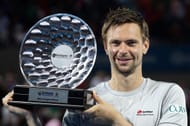
The last Swede to be ranked inside the ATP top 10 was Robin Soderling.
Soderling will forever be remembered for his remarkable win over the imperious Rafael Nadal on the clay courts of Roland Garros in 2009. Prior to this match, Nadal had never lost at the French Open, and few would have given Soderling any chance against the great Spaniard.
But remarkably, in what tennis legend Martina Navratilova has described as the 'greatest upset in tennis history', Soderling won the match in four sets. He was the first player to beat Nadal on clay in a best-of-five-sets match.
Soderling again made the final of the French Open in 2010, but he couldn't repeat his heroics of the previous year and fell to Nadal in the summit clash.
Soderling's win at the Paris ATP Masters 1000 in the year 2010 was his first and only ATP Masters title. A mononucleosis ailment kept him out of the sport from 2011, eventually forcing him to retire.
#7 Magnus Norman

Blessed with immense talent and potential, Magnus Norman's tennis career lasted only 8 years on the ATP Tour as he was frequently plagued by injuries. Multiple hip and knee surgeries forced him to retire from the sport in 2004 at the age of just 27.
Norman reached a career-high ranking of World Number 2 in the year 2000 after he made the final at Roland Garros, losing to Gustavo Kuerten. He won the Rome ATP Masters event that year, this time beating his French Open conqueror Kuerten.
After a strong showing in the first two Grand Slam tournaments of the year 2000 coupled with a win at the Rome Masters and a few more titles to his credit, Norman was well on course to grab the World No. 1 ranking. However, knee issues began to bother him and he was forced to sit out the second half of the season despite being the most successful player until June that year.
Norman later took up the role of coach to players such as Thomas Johannson, Robin Soderling and Stan Wawrinka. He won the ATP Coach of the Year award in 2016.
#6 Jonas Bjorkman
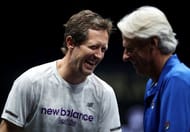
When you hear the name Jonas Bjorkman, you tend to think of a successful doubles player. That may be true, but what many people don't know is that Jonas Bjorkman was an accomplished singles player before transitioning to doubles.
Bjorkman was ranked a career-high World Number 4 in November 1997. At the US Open of that year, he made the semi-finals after defeating the likes of Gustavo Kuerten and Petr Korda.
Bjorkman won 6 ATP singles titles overall. He was a member of Sweden's Davis Cup championship teams in 1994, 1997 and 1998.
Remarkably, at the age of 34, nine years after his first Grand Slam semifinal appearance, Bjorkman made the semis at the All England Club in 2006. He thus became the oldest man since Jimmy Connors at the time to make the semis of a Major.
In doubles, Bjorkman completed a Career Slam, with nine Grand Slam doubles titles and 54 titles overall.
#5 Sven Davidson
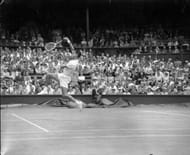
The first Swedish tennis superstar was the late Sven Davidson. He was the first-ever tennis player from the country to win a Grand Slam Singles title; he did so at the 1957 French Open, beating Herbert Flam in the final.
Prior to that, he was the runner-up at the French Open for two successive years, in 1955 and 1956.
Davidson reached a career-high world ranking of Number 3 in 1957. That year he also made the semifinals of both Wimbledon and the US Open. He won a total of 50 singles titles during the course of his career. He was also a part of the Swedish Davis Cup team from 1950 to 1960.
At the 1958 Wimbledon, Davidson paired up with fellow Swede Ulf Schmidt to win the doubles title. Davidson was inducted into the International Tennis Hall of Fame in 2007.
#4 Thomas Johansson
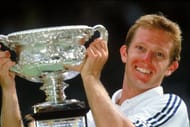
The last Swede to win a Grand Slam Singles title is Thomas Johansson. Johansson's crowing achievement came at the 2002 Australian Open, which he won beating Marat Safin in the final.
Johansson reached a career-high ATP world ranking of Number 7 that year. He also won an ATP Masters series event at Toronto, Canada, in 1999.
Prior to his 2002 Australian Open victory, Thomas hadn't made it even to a Slam quarterfinal in 24 previous attempts. He then made the semifinal at the All England Club in 2005, losing to eventual runner-up Andy Roddick in a tight four-set contest.
Hampered by a series of injuries, Johansson's career started to plateau post 2004. He would, however, win the silver medal at the 2008 Beijing Olympics in the penultimate year of his tennis career, with partner Simon Aspelin.
#3 Mats Wilander
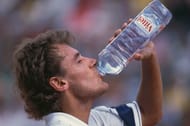
Mats Wilander is one of only four men in the history of tennis to have won a Grand Slam tournament on four different surfaces. Although he never won Wimbledon, Wilander won the Australian Open during the time when the tournament was played on grass.
A gifted teenager, Wilander peaked very early in his career, winning a total of four Grand Slam titles before turning 20 - an all-time record which still stands. Apart from seven Grand Slam singles titles, Wilander also won 8 Grand Prix Super Series titles - the precursor to the modern ATP Masters 1000 tournaments.
Wilander was one of the last Swedish players to be ranked World Number 1, before Stefan Edbergand he played a key role in Sweden's run to the Davis Cup final on seven different occasions through the 1980s.
In his 15-year career, Wilander accrued just under 8 million USD in prize money. He was inducted into the International tennis Hall of Fame in 2002.
#2 Stefan Edberg
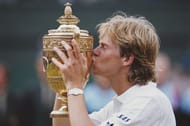
One of the foremost exponents of the now obsolete serve-and-volley style of play, Stefan Edberg was a colossal tennis force in the 1980s and early 1990s.
Edberg was a 6-time Grand Slam champion - winning two titles each at the Australian Open, Wimbledon and the US Open. Despite his style of play not being suited to clay, Edberg finished as runner-up at the French Open of 1989, narrowly missing out on a Career Slam.
A 4-time Davis Cup winner with Sweden, Edberg also won the ATP Finals twice - in 1985 and 1986.
Edberg is the only Swede till date to have been ranked as Number 1 in both singles and doubles. In doubles, Edberg won 18 titles including 3 Grand Slam tournaments. At the 1988 Seoul Summer Olympic Games, he won bronze in both the singles and doubles categories.
Edberg was inducted into the International Tennis Hall of Fame in 2004.
#1 Bjorn Borg
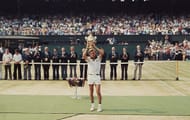
Without a shred of doubt, the greatest Swedish tennis player of all time has to be the legendary Bjorn Borg.
Known for his remarkable composure and ability to play the game at very high levels without displaying any signs of emotion, Borg was a superstar in the 1970's and 1980's.
His 89.81 % career win percentage at Grand Slams is the best of all time, and looks unlikely to ever be surpassed by anyone. Borg is one of only four players to have won three or more Grand Slam tournaments without dropping a single set.
The master of marathon matches, Borg just lost three out of 27 matches in his career that went the full distance of five sets.
With 11 Grand Slam titles and 64 ATP titles overall, Borg retired at the young age of 26 while still at the peak of his game. If he would have carried on playing for 5-6 more years, the Big 3 of today would likely still be chasing his Grand Slam tally.